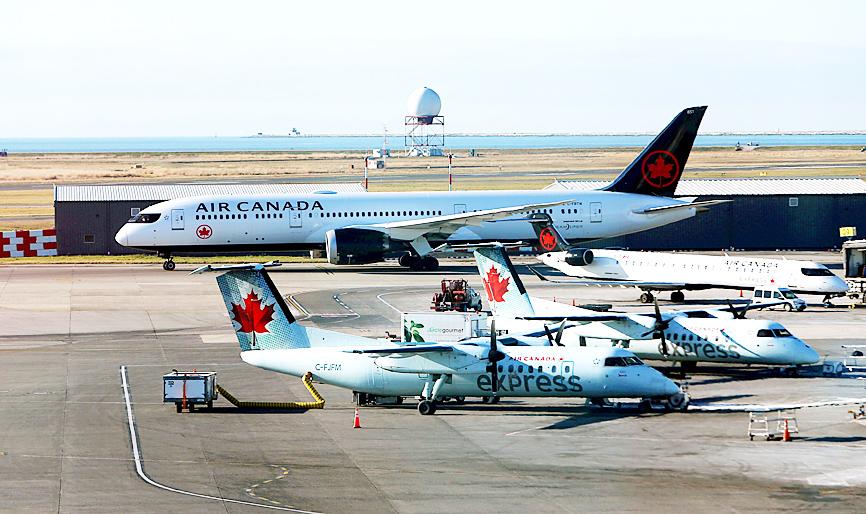Air Canada and the Canadian government on Monday agreed on financing that would allow the airline to access as much as C$5.9 billion (US$4.7 billion) to help it recover from the economic damage caused by the COVID-19 pandemic.
Canadian Deputy Prime Minister Chrystia Freeland said that the support includes C$4 billion (US$3.2billion) in loans and C$500 million (US$398 million) in equity that would give Canadians a stake in Air Canada, which is the country’s largest airline.
As part of the financial package, Air Canada has agreed to a number of commitments related to customer refunds, service to regional communities, restrictions on the use of the funds provided, employment and capital expenditures.

Photo: Reuters
In return for aid, the carrier is offering refunds to customers who bought non-refundable fares, but did not travel due to the pandemic.
Also in exchange for the bailout, the airline is resuming service for all regional communities where service was suspended.
Freeland, also the Canadian minister of finance, said that the airline has also guaranteed that there would be no further job losses.
She said that there would also be no stock buybacks or dividends and that executive compensation would be capped at C$1 million for any executive.
“These are hard and unprecedented times for our airline industry and our workers, as well as Canadian travelers,” Freeland said. “The airline industry is a strategic sector.”
Freeland said that the government is also talking with other Canadian airlines to determine what type of assistance they might need.
Air Canada last year lost C$4.6 billion, compared with a profit of C$1.5 billion in 2019.
Organizations supporting Air Canada’s calls for a bailout have included unions such as Unifor and the Canadian Air Traffic Control Association, as well as the National Airlines Council of Canada industry group.

CAUTIOUS RECOVERY: While the manufacturing sector returned to growth amid the US-China trade truce, firms remain wary as uncertainty clouds the outlook, the CIER said The local manufacturing sector returned to expansion last month, as the official purchasing managers’ index (PMI) rose 2.1 points to 51.0, driven by a temporary easing in US-China trade tensions, the Chung-Hua Institution for Economic Research (CIER, 中華經濟研究院) said yesterday. The PMI gauges the health of the manufacturing industry, with readings above 50 indicating expansion and those below 50 signaling contraction. “Firms are not as pessimistic as they were in April, but they remain far from optimistic,” CIER president Lien Hsien-ming (連賢明) said at a news conference. The full impact of US tariff decisions is unlikely to become clear until later this month

GROWING CONCERN: Some senior Trump administration officials opposed the UAE expansion over fears that another TSMC project could jeopardize its US investment Taiwan Semiconductor Manufacturing Co (TSMC, 台積電) is evaluating building an advanced production facility in the United Arab Emirates (UAE) and has discussed the possibility with officials in US President Donald Trump’s administration, people familiar with the matter said, in a potentially major bet on the Middle East that would only come to fruition with Washington’s approval. The company has had multiple meetings in the past few months with US Special Envoy to the Middle East Steve Witkoff and officials from MGX, an influential investment vehicle overseen by the UAE president’s brother, the people said. The conversations are a continuation of talks that

CHIP DUTIES: TSMC said it voiced its concerns to Washington about tariffs, telling the US commerce department that it wants ‘fair treatment’ to protect its competitiveness Taiwan Semiconductor Manufacturing Co (TSMC, 台積電) yesterday reiterated robust business prospects for this year as strong artificial intelligence (AI) chip demand from Nvidia Corp and other customers would absorb the impacts of US tariffs. “The impact of tariffs would be indirect, as the custom tax is the importers’ responsibility, not the exporters,” TSMC chairman and chief executive officer C.C. Wei (魏哲家) said at the chipmaker’s annual shareholders’ meeting in Hsinchu City. TSMC’s business could be affected if people become reluctant to buy electronics due to inflated prices, Wei said. In addition, the chipmaker has voiced its concern to the US Department of Commerce

STILL LOADED: Last year’s richest person, Quanta Computer Inc chairman Barry Lam, dropped to second place despite an 8 percent increase in his wealth to US$12.6 billion Staff writer, with CNA Daniel Tsai (蔡明忠) and Richard Tsai (蔡明興), the brothers who run Fubon Group (富邦集團), topped the Forbes list of Taiwan’s 50 richest people this year, released on Wednesday in New York. The magazine said that a stronger New Taiwan dollar pushed the combined wealth of Taiwan’s 50 richest people up 13 percent, from US$174 billion to US$197 billion, with 36 of the people on the list seeing their wealth increase. That came as Taiwan’s economy grew 4.6 percent last year, its fastest pace in three years, driven by the strong performance of the semiconductor industry, the magazine said. The Tsai